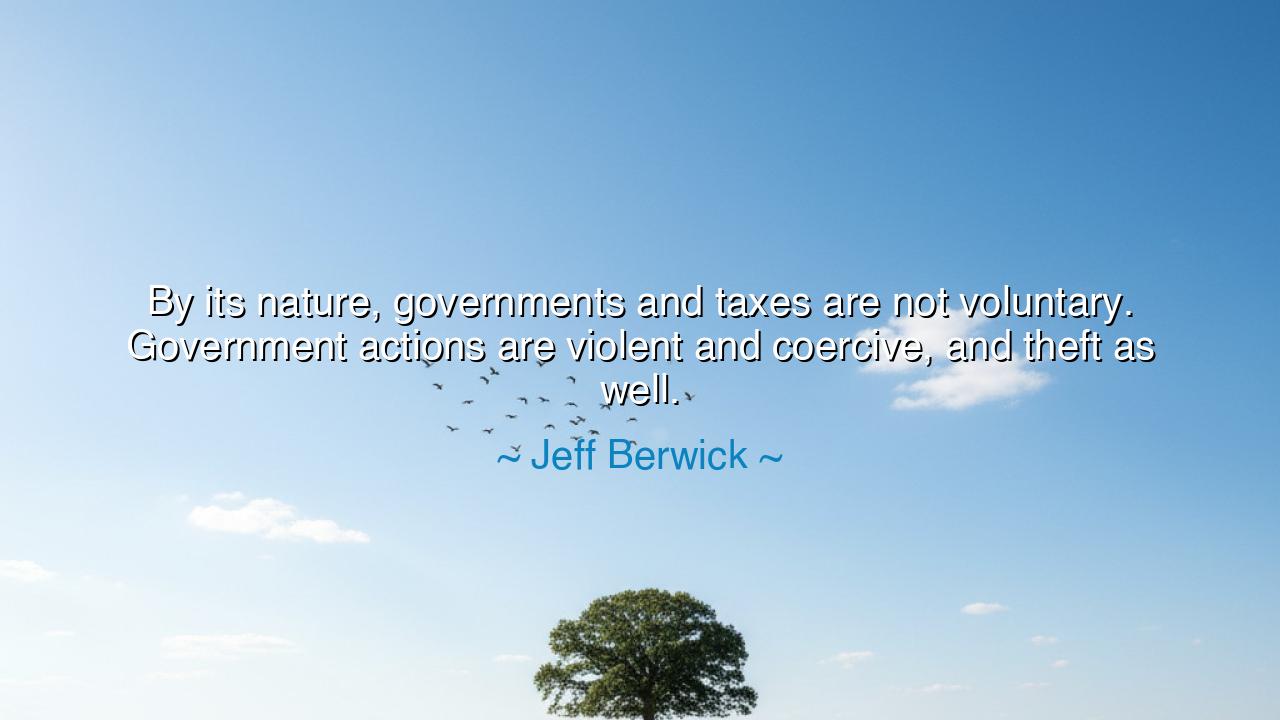
By its nature, governments and taxes are not voluntary.
By its nature, governments and taxes are not voluntary. Government actions are violent and coercive, and theft as well.






In the sharp and unyielding language of rebellion, Jeff Berwick, a modern advocate of liberty and critic of authority, once declared: “By its nature, governments and taxes are not voluntary. Government actions are violent and coercive, and theft as well.” His words strike like a hammer upon the anvil of civilization—harsh, provocative, and yet forged from a truth that has haunted humanity since the dawn of power. To the unreflective, they sound like defiance; to the wise, they are a warning—a call to remember that freedom and coercion have always stood as eternal adversaries in the human story.
To understand Berwick’s meaning, one must begin with the nature of government itself. A government, he reminds us, is not a merchant with whom one trades, nor a neighbor with whom one bargains. It is an entity that claims authority over all within its borders, demanding obedience and tribute—whether through law, taxation, or force. Even the most benevolent government, Berwick argues, rests upon the threat of punishment. Every law carries behind it the silent shadow of the sword. Every tax bill, unpaid, leads in time to fines, seizures, and imprisonment. Thus, he calls government actions coercive—not because they are always cruel, but because they are compelled, not chosen. His words strip away the noble mask of law to expose its primal core: the power to compel.
This idea, though shocking in its phrasing, is not new. The ancients, too, wrestled with the tension between authority and liberty. In the time of Plato, philosophers sought to justify the rule of the wise, arguing that the chaos of ungoverned men would destroy them all. But others, like Lao Tzu in the East, taught that the best ruler governs least, and that when the state grows too strong, it strangles the soul of the people. The balance between freedom and control has never been easy to find. Berwick’s voice joins this timeless debate, taking the side of those who see government not as protector, but as master, and the citizen not as participant, but as subject.
Consider the story of the American Revolution, when colonists rose against the British Crown under the cry of “No taxation without representation.” Though the taxes imposed by Britain were small by modern standards, the principle was vast: they were not voluntary. The people had no voice in their own burden, and thus the taxes became, in their eyes, a form of theft. From this defiance was born a new nation, one founded on the idea that government must derive its just powers from the consent of the governed. And yet, as Berwick would note, even this new republic, over time, grew into the very thing it once resisted—a system that compels its citizens to pay and obey, whether they agree or not. History, it seems, turns in circles, and freedom must be reclaimed again and again.
In calling taxation “theft,” Berwick challenges the moral justification of compulsion. He asks: if taking another man’s property by threat of force is wrong for an individual, how does it become right when done by the state? He does not deny that taxes fund roads, schools, and defense; he simply insists that morality cannot be transformed by numbers. Ten men forcing one to surrender his earnings do not make justice—they only make tyranny democratic. His challenge is radical, but his purpose is not mere destruction. He seeks to awaken the spirit of personal responsibility, to remind men that voluntary exchange, not coercion, is the foundation of peace. When people act freely, he believes, cooperation arises naturally; but when they are forced, resentment and corruption follow.
Yet even as we listen to his words, we must temper them with reflection. For though governments are indeed coercive, they are also the means by which humanity has built stability out of chaos. Without some measure of authority, the strong would devour the weak, and greed would turn liberty into anarchy. The wisdom of the ages teaches that freedom without order becomes destruction, just as order without freedom becomes slavery. The challenge, then, is to find the sacred balance—to ensure that power serves justice rather than devours it. Berwick’s cry reminds us not to destroy government, but to restrain it, to bind it in the chains of accountability and keep its reach always answerable to the people.
So, my children of the modern world, learn this lesson: freedom is not given—it must be guarded. Governments, like fire, are useful servants but dangerous masters. Do not let comfort make you blind to coercion, nor security make you forget the value of consent. Question authority, not out of hatred, but out of love for truth. Pay your dues if justice demands it, but never forget that true liberty lies in the freedom to choose.
And thus, remember the fierce wisdom of Jeff Berwick: that all systems of power, no matter how noble their birth, carry within them the seeds of coercion. To live as free men and women is to remain ever watchful—to demand that the hand of government, which can so easily become the fist of force, remain open and restrained. For only when power serves willingly, and freedom is defended fiercely, can humanity rise above the eternal shadow of its own creation.






AAdministratorAdministrator
Welcome, honored guests. Please leave a comment, we will respond soon